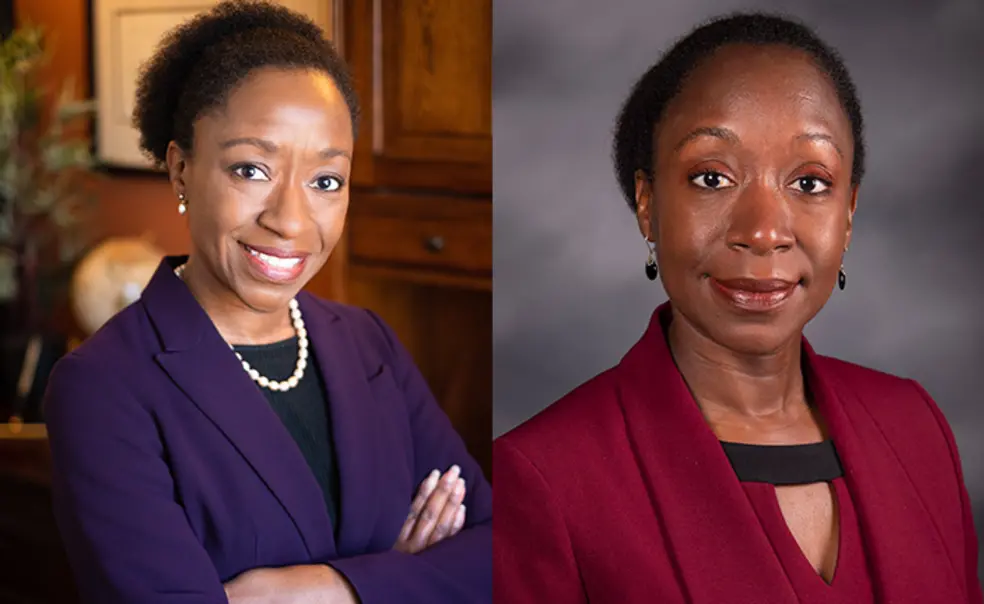Twins Cass Cliatt ’96 and Lasagne Wilhite ’96 Are Building Inclusivity
‘I can think of no greater mission than to help people with their civil rights’
“You never know who’s watching,” Cass Cliatt ’96 told her twin sister Lasagne “L” Wilhite ’96.
Cliatt had recently learned that a school in New Orleans, Louisiana, pinned her picture on an inspirational bulletin board of Black people who are “firsts” in their fields. In her current position at Brown University, Cliatt is the first Black person to lead communications or public affairs at an executive level — reporting to the university president — at an “Ivy plus” school, meaning any of the Ivies plus MIT, Stanford, and the University of Chicago.
Wilhite gets emotional when she talks about her sister that day: “She has been a trailblazer before I have been a trailblazer.”
Wilhite is a “first” as well. In 2018, in the wake of the “Me Too” movement, she was selected by the U.S. House of Representatives to build, staff, and oversee a new Office of Employee Advocacy. It is Congress’s first in-house office providing legal counsel to employees with race, sex, safety, or other concerns at work, and it may be the only one of its kind in the country.
The realization that people, particularly young people, are watching their accomplishments strikes a chord with the sisters because so much of their work is done behind the scenes: Both are charged with transforming their respective institutions, cultivating cultures and environments in which everyone can thrive.
Cliatt and Wilhite graduated from high school in Panama City, Florida, as co-valedictorians with identical GPAs and identical SAT scores. They grew up “knowing that we didn’t have a lot,” says Wilhite. “Our parents always cited education as … the way to overcome the barriers and challenges that were around us. Even when they had not attained the education levels that they wanted yet, they pushed us to.”
Now a self-described “evangelist for higher education,” Cliatt says the core of her work is shaping the relationship Brown has with students who might ask, “Can this be a place for me?” She says she takes seriously the task of continuing the “long overdue” efforts of higher education to be more inclusive and supportive of students from historically underrepresented backgrounds.
She’s particularly proud of her work contributing to Brown’s Diversity & Inclusion Action Plan. In 2015, college campuses, much like the rest of the country, faced a reckoning with racial justice. The plan was part of Brown’s response. To ensure it recognized and honored the years of activism on Brown’s campus, Cliatt and her team crafted a written history. “And what was gratifying,” Cliatt recalls, “is that when that was finished, we heard that it was the part of the plan that our student activists felt most connected to and most grateful for.”
Wilhite’s Office of Employee Advocacy is also making a prominent institution more inclusive. Her proud moments come with daily addressing a decades-long power imbalance between employers — who have long had the privilege of in-house counsel — and employees, who have had to rely on outside, private counsel for any instances of discrimination, harassment, or retaliation (if they could afford it). While Wilhite is passionate about striving to resolve issues without litigation, the office is unique in that, if a lawsuit between employees and management is necessary, it provides legal representation to employees with the same attorney-client privilege they would have with an outside law firm.
“I can think of no greater mission than to help people with their civil rights in a way that they’ve never been represented before,” she says. From employees who are navigating a health issue that impacts their work, to employees who, in the aftermath of racialized traumatic events, feel prompted to ask for help — Wilhite said she represents individuals who otherwise may not have the resources to address these difficult situations.
Reflecting on their work, Cliatt emphasizes the theme of service, a value exemplified by their parents, who are both veterans of the U.S. Air Force: “I’m telling the stories that deserve to be told and, likewise, my sister is using her expertise and talent to represent the people who have to be represented.”












No responses yet